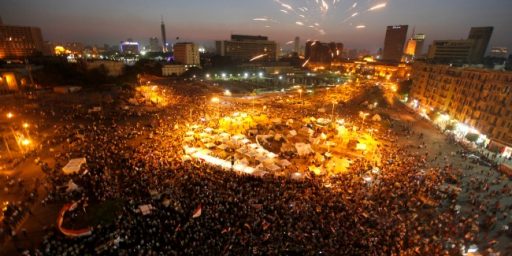Obama Condemns Egypt Violence, Doesn’t Do Much Else
In a speech delivered via audio only from his vacation home on Martha’s Vineyard, President Obama spoke out against the violence in Egypt, but he didn’t do much else:
VINEYARD HAVEN, Mass. — President Obama, deploring the military-led Egyptian government’s deadly crackdown on Muslim Brotherhood protesters there, said on Thursday that the United States would pull out of scheduled joint military exercises with the Egyptian army in the Sinai Peninsula.
“While we want to sustain our relationship with Egypt, our traditional cooperation cannot continue as usual while civilians are being killed in the streets,” Mr. Obama said in remarks delivered from his rented vacation home on Martha’s Vineyard.
“The Egyptian people deserve better than what we’ve seen over the past several days,” the president said, adding that the “cycle of violence and escalation needs to stop.”
Mr. Obama’s announcement, though less sweeping than other potential steps like suspending $1.3 billion in American military aid to Egypt, is the first concrete American response to the violence, which American officials for weeks have urged the Egyptian authorities to avoid.
The joint military exercises, known as Bright Star, were scheduled to start next month. They are a major biennial exercise led by American and Egyptian forces, and involving hundreds of troops and airmen from both countries, that date to the early 1980s.
The president said he had asked his national security staff to study whether further measures were warranted, given the widespread bloodshed in Cairo and other cities. He said the United States opposed steps like the imposition of martial law.
But while Mr. Obama condemned the violence, which has left more than 500 demonstrators dead and thousands wounded, he emphasized that the United States did not intend to abandon its broader partnership with the Egyptian military, which has spanned three decades.
And Mr. Obama made no mention of whether the military’s ouster of President Mohamed Morsi last month constituted a coup, a legal designation that could trigger a cutoff of the military aid. The administration has avoided making that judgment, saying that to do so would not be in the American national security interest.
The president also expressed sympathy for antigovernment protesters whose wide-scale uprising against Mr. Morsi precipitated the military’s intervention. Mr. Morsi’s government, he said, was not inclusive and had lost the support of “perhaps even a majority” of Egyptians.
Still, the president said, the proper path for Egypt was a process of political reconciliation, not a brutal crackdown on Mr. Morsi’s supporters and the Muslim Brotherhood.
Administration officials fear that suspending that aid could destabilize the region, jeopardize Israel’s security, and would deprive the United States of its only lever to use on the generals. Analysts also say that if the United States withdrew its support, Egypt’s generals would be able to replace it with increased assistance from Saudi Arabia.
“America cannot determine the future of Egypt,” Mr. Obama said. “We don’t take sides with any particular party or political figure.” He added, “I know it’s tempting inside Egypt to blame the United States,” noting that protesters have alternately accused Washington of supporting Mr. Morsi and colluding with those who deposed him.
Of course, by continuing for the most part the military aid that the United States has been providing to the Egyptian military for the past three decades, one could argue that the United States is taking sides in Egypt’s current political disputes. As with last month’s decision to delay the delivery of four F-16s that are part of a larger contract, cancelling a military exercise is little more than a symbolic exercise. The military aid will continue, as will the high level contacts between the U.S. military and the Egyptian military. How, precisely, the Egyptians will think that they are being punished by this is entirely unclear to me.

![Military Coup Underway In Egypt [Update: Morsi Deposed]](https://otb.cachefly.net/wp-content/uploads/2011/02/egypt-flag3-512x256.gif)




Let’s see if the “delay” of the F-16’s becomes a permanent cancellation as well as all the other aide to Egypt.
As I commented the last time you broached this subject. Pure conjecture on your part offered as fact with absolutely nothing to support it.
It will take time. Treaties are treaties and our congress is totally dysfunctional but this will pan out eventually. Perhaps not as quickly as you’d prefer, but I’m confident it will happen.
Frankly I’d prefer we discontinue military aide to both Egypt and Israel but that’s not likely.
Can we pull out of our commitment to keep two Carrier Air groups in the Med tomorrow? No we can’t.
@Davebo:
This is unlikely. Basically, the US government gives Egypt money which it uses to buy F-16. In order to allow Egypt to finance multi-year contracts, the government has allowed Egypt to commit money from future years’ payments with the US government backing the credit in case of an Egyptian default.
So basically even if the government doesn’t let Egypt have F-16s, it’s still on the hook for paying for them.
for consideration, a wikileaks cable from the then US ambassador to Egypt. Note the Egyptian view the military aid is “…”untouchable compensation” for making and maintaining peace with Israel.”
Looks like diplomatic hand wringing is all that is possible.
While the Egyptian Army is engaged in saving their nation from the Brotherhood Jihadists, we should be looking for ways of supporting them.
“Egypt Seethes as Toll Rises and Islamists Take to Streets” http://www.nytimes.com/2013/08/16/world/middleeast/egypt.html?hp
Not fueling the fire is part of the job description. I’m ok with a strongly worded public statement right now.
Obviously, he’s playing another game of 11th dimensional chess (reg TM of Obama Inc.)with them that mere mortals misconstrue as “not doing much else.”
@edmondo:
Well, Edmondo, Obama is probably waiting for you to tell him that simple solution that will resolve the situation. Don’t be shy; tell us what it is. We’re waiting…
@stonetools:
Gee, I don’t know. Maybe stop sending a billion dollars a year in weapons to generals who kill their own people could be a good start. Don’t be shy. Why don’t you mention it to Obama the next time you see him. I’ll wait to hear what he says. Still waiting…. Still waiting……Still waiting……
First off, let’s stop pretending that we govern Egypt. We don’t. We have some influence around the margins, that’s it.
Egyptian democracy failed. Set aside the various policies, bottom line Morsi did not find a way to gain the support of the military which was always going to be the greatest threat to his government.
Maybe the support of the generals was simply un-winnable — maybe they’re like Republican congressmen and committed to a nihilistic path. But given that the military allowed an election and allowed Morsi to take office, I doubt that’s it.
If we had a choice between a reformed Muslim Brotherhood committed to a tolerant and pluralistic state on the one hand, and brutal generals on the other, obviously we’d prefer the first. Was that the choice?
Or was it rather a choice between committed Islamists determined to oppress religious minorities and deprive women of the slight gains they’ve made on the one hand, and brutal generals on the other? I don’t know that for sure, but the second seems more likely, especially given that MB are busy burning Christian churches.
If that’s the choice: unreconstructed, old-school Muslim Brotherhood vs. brutal generals, I’ll take brutal generals. Brutal generals usually stick to oppressing their own people — especially when they’re being handsomely paid to do so — and, lacking an ideology, they don’t try to spread one elsewhere.
If what we have is a choice between bad and worse, we go with bad. So cancel some exercises, stall some jets, make some noises, hope the generals have at least some lingering shred of decency and kick the can down the road.
@edmondo: Yes. Of course! And when the Egyptian army moves an armored division or two into the Sinai peninsula in response, I am sure you will be the one to convince the Israelis to not escalate the situation.
Wow, this is shocking, I expected him to support the violence, and perhaps send in drones and troops to add to the chaotic situation.
I’m not sure what anyone expects America to do in response to the violence in Egypt, do you? Perhaps we cannot control the trajectory of events in every country in the world.
@al-Ameda:
But apparently it’s our job to try!!!!!!!!!!!!!!!!!!!!!!!!!
What’s the point of having muppet states if you don’t make their mouths move every once in a while?
@al-Ameda: Clearly we should invade.
In case you haven’t heard, we own that one too.
@edmondo: In case you haven’t heard, rightly or wrongly, a large majority of the American people takes threats to Israeli security very seriously. Now, i happen to think this is an unfortunate circumstance, but you think any American president will ignore it when he thinks about his Middle East strategy?
@Amos Jones:
The 21st century way for the US to support a regime in the ME is to not cuddle up with them. The supporters of the old way, the ones that strongly feel the religious movements will drag Egypt back into a more primitive state, are not interested in bearing the dreaded “US puppet!” label.
http://youtu.be/WL_mEYP8N-A
A more precise translation to American vernacular of “Your mother your father” would be “Yo mama”.
Good.
We have lost enough lives and treasure trying to re-create American democracy in a part of the world controlled by feuding religious zealots. At least in our nation one particular brand of zealotry has dominated – really cuts down on the bloodshed.
@Tony W:
Why do you assume we aren’t paying for it? The next time the Muslim world goes ape-shit on America it won’t be because “they hate us for our freedoms”. It’s because we look like we are waging a war on Islam.
@edmondo: Doesn’t matter. We pay either way, we might as well hold the moral high ground, condemn the zealots with our words (and ‘inaction’) and stay above the fray.
@michael reynolds:
Except that General Sisi was promoted to the head of the military by Morsi, which was a surprise to many at the time given that he was jumped over a lot of more senior generals. Sisi is also described as being extremely religious.
So what happens if we end up with old-school Islamists AND brutal generals?
I wouldn’t support the Muslim Brotherhood if I were an Egyptian voter, mind you, but it seems to me a lot of the complaints about them were overblown. Since Morsi was inaugurated, they haven’t really done anything I would consider particularly out of the ordinary for the region. A lot of the concern seemed to be things everyone was scared they were going to do, but it seems odd to treat potential future oppression as equivalent to actually occurring oppression by the military.
@Stormy Dragon: I wouldn’t support the Muslim Brotherhood if I were an Egyptian voter, mind you, but it seems to me a lot of the complaints about them were overblown.
How about these complaints? In response to the military cracking down on them, they’re essentially declaring war on Egyptian Christians.
I guess it’s too bad they don’t have any Jews in Egypt. They’re the traditional scapegoats, aren’t they?
@Jenos Idanian #13:
The fact the MB has responded to the crackdown with secterian violence is inexcusable, but you can’t really use sectarian violence that occured after the military massacred hundreds of protestors as justification for that massacre.
Furthermore, if violence against copts is what drove the military to act, why aren’t they out in Helwan stopping the Christians from being attacked, rather than wasting time murdering people in Cairo that have nothing to do with those attacks?
Maybe the military doesn’t care about Christians any more than the MB does and is just using that as a convenient excuse because they know the useful idiots in the American right are always willing to overlook violence against muslims in the name of Jesus.
@Stormy Dragon:
I guess, given the history of the region, neither of us will faint in surprise.
I would say Mr. Morsi overestimated the effect of religion, and underestimated the effect of institutional loyalty on the general.
@Stormy Dragon: The fact the MB has responded to the crackdown with secterian violence is inexcusable, but you can’t really use sectarian violence that occured after the military massacred hundreds of protestors as justification for that massacre.
Furthermore, if violence against copts is what drove the military to act, why aren’t they out in Helwan stopping the Christians from being attacked, rather than wasting time murdering people in Cairo that have nothing to do with those attacks?
The Brotherhood was already going after the Copts when they were in charge. Their ouster from power just had the effect of ramping up their attacks.
The point I’m making here is that the Brotherhood, while democratically elected, are not nice people. While in power, they were already acting in their own sweet tyrannical way. And now that they’re out of power, they’re lashing out in their rage.
It would be nice if our Middle East policy wasn’t completely dominated by what is best for Israel…if that weren’t the case, perhaps then proper and positive decisions could be made about situations like this one…
This isn’t an argument over Israel, its an argument about the direction of Egypt which has always been on a a low simmer but hard times has brought to a boil. The hard times is a function of an exploded population and limited resources. Typically, when “stuff” gets tight people tribe up, square off, and settle the pie-slicing the old fashioned way. The search for white hats begins and ends in Hollywood most of the time. This is definitely most of the time.
We seem to have incorporated the opinion that we can control things into our very bones. We thought that after GW 1, but the truth is the only instrument we have that can actually do that is our military. Perhaps the habit of pretending otherwise is due to our knowledge it’s stupid and not worth the cost and we soak in that river in Egypt to avoid acknowledgement of limitations.
Power is a hell of a drug.
Perhaps it isn’t directly about Israel, but if it weren’t for Israel, we would have many more options when it comes to all the military aid directed at Egypt by our government…
I think the whole “most valuable ally” is a crock as well. Biggest PITA is what they are. What use were they in GW1? Had to defend them too because Saddam wanted Israel to attack him. Look at the contingency plans to do something in Syria and you won’t find any planning for basing in Israel for that one either.
What can ya say? Love is blind. However, that bit of money isn’t going to move the Egyptian military one inch in this, and we could cut it off any time. They aren’t going to pick a fight with Israel if they don’t get it.